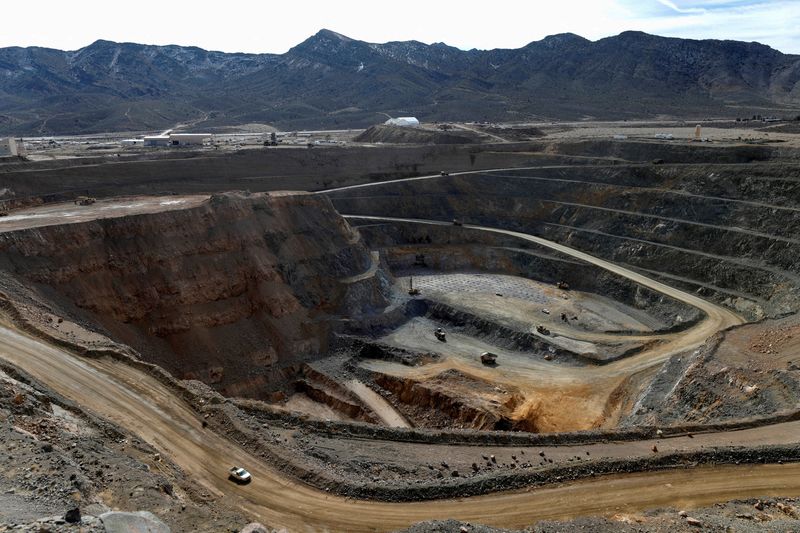By Ernest Scheyder
(Reuters) -Mining trade groups plan to push Washington to revive and expand the long-dormant Bureau of Mines, an effort aimed at streamlining how the U.S. government regulates and supports critical minerals production and timed to coincide with the 2024 presidential election.
The lobbying campaign, details of which have not previously been reported, is set to launch this month ahead of the Republican and Democratic political conventions. It will contrast scattered U.S. mining oversight with Australia and other countries where senior mining-related agencies report directly to heads of government, according to three sources with direct knowledge of the effort.
Lithium, copper and other critical minerals are used in many electronics and demand is expected to surge further in coming years for production of electric-vehicle batteries. China is the world's largest producer or processor of many critical minerals.
U.S. mining policy is currently administered through multiple agencies, including the Bureau of Land Management, the Fish and Wildlife Service, and the Mine Safety and Health Administration.
The bureau closed in 1996 during budget cuts. The push to resuscitate it and add new responsibilities would, supporters argue, allow Washington to craft a unified critical minerals policy for permitting, research funding, and industry grants and loans that could stretch between presidential administrations and help the U.S. better compete with China.
"Mining decisions right now are spread across multiple government agencies, and that makes transparency and accountability very difficult," said Rich Nolan, head of the National Mining Association trade group, which is spearheading the push alongside the American Exploration & Mining Association and the Society for Mining, Metallurgy & Exploration (SME).
The SME, which represents academics and others conducting mining-related research, is crafting a position paper that the two other groups will use to lobby members of Congress, according to one of the sources.
The groups acknowledged that they are not likely to succeed this year but hope to in the next Congress, which runs from 2025 to 2027, the source said, adding that there is no estimate yet for how much funding a revived bureau would need.
"If a new bureau could bring some efficiency to a duplicative and inefficient permitting process, it could be a huge benefit to the country," said Mitch Krebs, CEO of Coeur Mining (NYSE:CDE), a Chicago-based silver miner.
Critics of this latest plan note that the original Bureau of Mines never oversaw mine permitting and that mines could still face opposition from conservation groups and environmental regulators.
"The Bureau of Mines coming back into existence is not going to fix any of that," said Michelle Michot Foss, the fellow in energy, minerals and materials at Rice University's Baker Institute for Public Policy. "There's nothing serious on the table that would make the mining industry function better than it is now."
Additionally, the bureau would need to be elevated to a cabinet-level agency if the goal is to have it report directly to the president, a step that would require congressional approval.
"We continue to advance responsible and sustainable mining through the efforts of federal agencies such as" the Department of the Interior, Department of Energy and Department of Defense, White House spokesperson Angelo Fernandez Hernandez told Reuters.
Founded in 1910 after a string of mining disasters, the bureau grew to a staff of more than 4,000 by 1960 that inspected mines, conducted minerals-related research, studied specialized metals for the space age and operated a helium-separation plant that supplied NASA.
In 1996, its $152 million annual budget was eliminated as part of a budget deal between Republicans and then-President Bill Clinton.

Rhea Graham, who was appointed by Clinton in 1994 as the first Black woman to lead the bureau, was given only 90 days to close it.
"When the bureau was closed, a signal was sent about how we as a nation valued science and how science funding was more precarious than perhaps people think it is," Graham said.